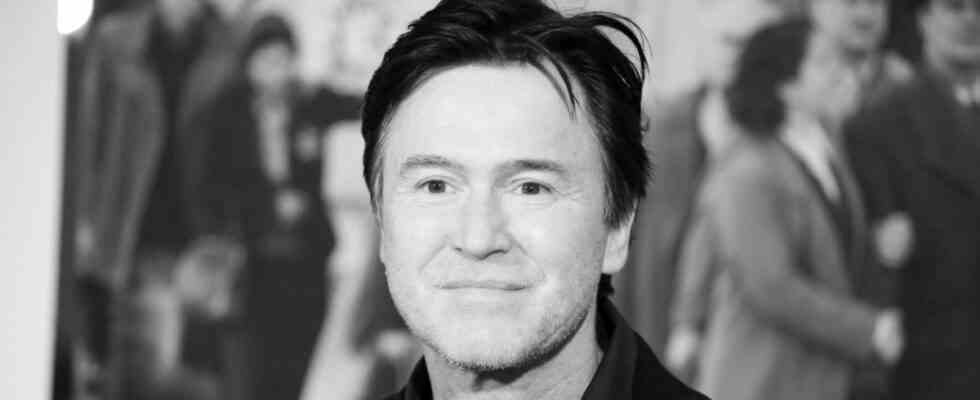Others stick their tongues out at the audience, Uwe Bohm stretched his butt in 1987. The magnificent specimen was emblazoned, outrageously naked and plump, on a seven-meter-high poster by the artist Gottfried Helnwein above the entrance to the Hamburg Schauspielhaus, and the way the 25-year-old Bohm looked over his left shoulder in his undershirt was snotty and wild. A bang motif. “Andi” was written in large letters above the angry young man. It was the announcement poster for the rock musical of the same name by Peter Zadek and Burkhard Driest: the (true) story of a difficult Barmbek boy who wants to be a rocker, walks the streets with his gang and is shot by a tobacconist. Zadek’s alternative to “Cats”. Live there: the Collapsing new buildings. In the title role, a real young man from Hamburg who knows the protagonist’s social milieu from his own experience. It will be his breakthrough in the theater. From then on, Uwe Bohm, who never attended drama school, has been part of the legendary Zadek family.
“You’re not an actor, that’s the great thing,” Zadek told him
Bohm was a power actor in his own right. A diamond in the rough. There was something unpolished, unsophisticated, untamed energetic about him. With his black beady eyes, he stares into vastness and abysses that frighten others. He had this crazy look, framed by a full head of black hair, which predestined him to be a villain, especially on television, usually a very charming one that not only women fall for. If he wasn’t the murderer in “Tatort” and other thrillers, then he was at least highly suspicious. The great, always also perfidious seer (and exploiter) of people, Zadek, liked precisely this rawness about him, the skin flavor of the street and the proletariat that surrounded him: “You’re not an actor, that’s the great thing.”
He was born on January 24, 1962 as Uwe Geländemann in Hamburg-Wilhelmsburg. His father was a crane driver in the port and a spy for East Germany, and his mother was an alcohol-loving housewife. When the family breaks up, the boy comes to the home. He is considered to have behavioral problems, and he drops out of school. Uwe Bohm owes his first steps as an actor, as well as his new surname, to his later adoptive father, the auteur filmmaker Hark Bohm. He cast him in 1973 as an eleven-year-old in the television film “I can also build an ark” and in 1976 in the cinema film “Nordsee ist Mordsee”, today a Hamburg classic: two 14-year-olds steal a dinghy in order to sail out into the wide world. 40 years later, in his film adaptation of Wolfgang Herrndorf’s “Tschick” (2016), Fatih Akin told a similar story about two boys in a stolen Lada. This time Uwe Bohm as the father – a violent man of money who is not interested in his son Maik. In between lies the astonishing acting career of an autodidact at risk of falling, who, by his own admission, could very well have “become a bandit”.
But then it became the theatre. After breaking off two apprenticeships, Uwe Bohm made his debut in 1983 at the Hamburg Kleckstheater in Gerd Heidenreich’s “Strafmündig”, then managed to audition at the Hamburger Schauspielhaus, played in “Möwe” and in “Pünktchen und Anton” and was thus discovered by Peter Zadek, another important one father figure in his life. He was Jack the Ripper in Zadek’s famous “Lulu” production with Susanne Lothar (1988) and the gay killer John in Neil LaBute’s civilization shocker “Bash” (2001), often taking on only small parts. Then in 2004 the title role in Ibsen’s “Peer Gynt” at the Berliner Ensemble: Bohm as an exuberant free-climber and Springinsfeld in a children’s head theater out of the rappel box, eternal Oedipussi and a bit also stupid Tor.
Bohm played at the Burgtheater in Vienna with Claus Peymann, at the Salzburg Festival, with Elmar Goerden at the Bochum theater and at the Nibelungen Festival in Worms, where he played Hagen in 2008. Since Zadek’s death in 2009, however, he has seemed to have disappeared from the stage, with the exception of one role: that of nephew Mortimer Brewster in the long-running Arsenic and Lace Hats at Hamburg’s St. Pauli Theater (with Eva Mattes and Angela Winkler as the lovely master slayers). In the cinema, where he celebrated one of his greatest successes in 1988 in Hark Bohm’s German-Turkish love drama “Yasemin”, he was sometimes still seen, for example in films by Thomas Arslan (“Gold”) or most recently in Udo Flohr’s “Effigie – Das Gift”. und die Stadt” (2019) about the Bremen poisoner Gesche Gottfried. But mainly Uwe Bohm had shifted to (series) television in the last ten years, where he embodied the shady types and unsympathetic, cunning pimps, bullies, neighborhood bigwigs.
The news that Uwe Bohm died “suddenly and unexpectedly” in Berlin on Friday at the age of 60, as his family announced at the weekend, comes as a shock. The actor once said that breaking off, leaving, not finishing something is his life’s work. His death came much too early. He leaves five children by four wives and a great sadness.

